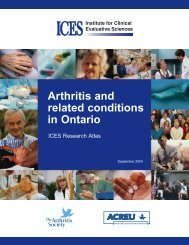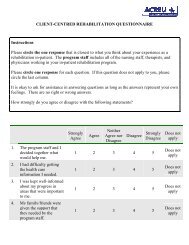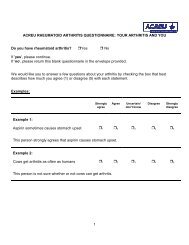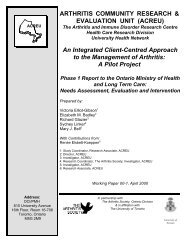Client-Centred Rehabilitation - Arthritis Community Research ...
Client-Centred Rehabilitation - Arthritis Community Research ...
Client-Centred Rehabilitation - Arthritis Community Research ...
Create successful ePaper yourself
Turn your PDF publications into a flip-book with our unique Google optimized e-Paper software.
32<br />
had been involved in goal setting and<br />
decision-making.<br />
“Because they have a consultation,<br />
there is a long waiting list, but they<br />
have a consultation with you, and<br />
your family members and then they<br />
have goal-setting. Then they even<br />
upgrade that. Then at the end of<br />
your time with them, then they<br />
review the time with them, then they<br />
review the goals and see what was<br />
accomplished and hopefully<br />
everything has been.” ABI #2<br />
Another member of the ABI focus group<br />
shared the same sentiment:<br />
“I have been a client and still am a<br />
client of (rehab2) and I have been a<br />
client of M’s for a couple years. K<br />
as well. They have been fantastic as<br />
team, as a family support.”<br />
Although participants acknowledged and<br />
valued the support they received from their<br />
families, many struggled with becoming<br />
dependent on their family members for<br />
assistance, particularly with day-to-day<br />
activities. For example, one person<br />
mentions how he had lost his ability to drive<br />
and how he had to rely on his wife to drive<br />
him around the community:<br />
“I’m not driving these days. If I<br />
need to go anywhere she needs to<br />
drive me. It’s like she is sitting<br />
downstairs for 2 hours this morning I<br />
hate to impose that on her. So<br />
yeah…I’m kind of mad and why did<br />
this happen…” ARTH #4<br />
<strong>Client</strong>s encountered difficulty in seeking<br />
assistance from their family members. For<br />
example, one participant described<br />
struggling to obtain help from her daughter<br />
who was busy with her own life:<br />
“Now my daughter she’s at home but<br />
she’s working and so it was a dog<br />
and pony show to get everything<br />
kinda organized you know by the<br />
stand so I could reach it. No one<br />
ever…you know I think the<br />
upside…the other side of it was that<br />
I just…I knew I could ask for it but I<br />
couldn’t be bothered. There was too<br />
much to cope with…with getting<br />
through the day and getting myself<br />
organized to bother hassling…If I<br />
have to hassle to get this for two<br />
hours twice a week its not worth it.”<br />
PTPART #1<br />
The process of clients receiving assistance<br />
from family members was also complicated<br />
by the idea of being a burden to their family.<br />
The majority of COPD clients remarked on<br />
how they did not like being a burden on<br />
their family members. One client stated his<br />
difficulty with being dependent on his son<br />
for help with household activities:<br />
“Yeah, but if you had a son with his<br />
own business; and listen I need you.<br />
How are you going to leave<br />
everything? It’s very tough.” COPD<br />
#2<br />
In some situations, the support extended to<br />
family actually supplementing the care they<br />
received in an institutional setting,<br />
particularly acute care.<br />
“Going into hospitals today if you<br />
have family member or somebody<br />
come in and you know help out or<br />
you just don’t get the help. The scary<br />
thing, the frightening thing for me to<br />
go for a stay in the hospital. Nobody<br />
looks forward to it but if you didn’t








